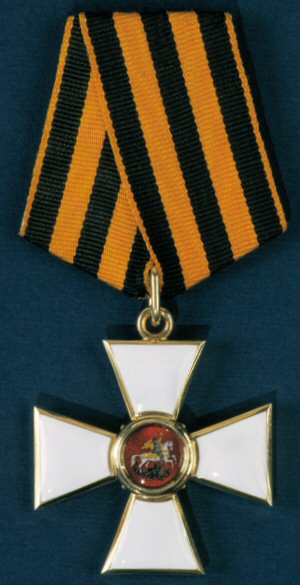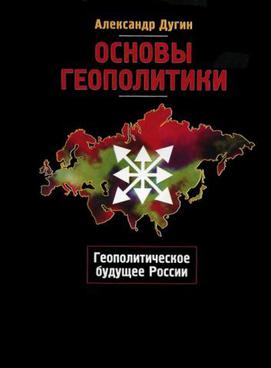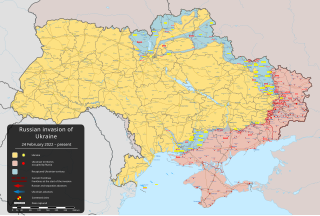Related Research Articles

The Armed Forces of the Russian Federation, commonly referred to as the Russian Armed Forces, are the military of Russia. It is organized into three service branches—the Ground Forces, Navy, and Aerospace Forces—two independent combat arms, and the Special Operations Forces Command.

The Union of Soviet Socialist Republics (USSR), commonly known as the Soviet Union, was a transcontinental country that spanned much of Eurasia from 1922 to 1991. During its existence, it was the largest country by area, extending across eleven time zones and sharing borders with twelve countries, and the third-most populous country. An overall successor to the Russian Empire, it was nominally organized as a federal union of national republics, the largest and most populous of which was the Russian SFSR. In practice, its government and economy were highly centralized. As a one-party state governed by the Communist Party of the Soviet Union, it was a flagship communist state. Its capital and largest city was Moscow.

The Battle of Borodino took place near the village of Borodino on 7 September [O.S. 26 August] 1812 during Napoleon's invasion of Russia. The Grande Armée won the battle against the Imperial Russian Army, but failed to gain a decisive victory and suffered tremendous losses. Napoleon fought against General Mikhail Kutuzov, whom the Emperor Alexander I of Russia had appointed to replace Barclay de Tolly on 29 August [O.S. 17 August] 1812 after the Battle of Smolensk. After the Battle of Borodino, Napoleon remained on the battlefield with his army; the Imperial Russian forces retreated in an orderly fashion southwards. Because the Imperial Russian army had severely weakened the Grande Armée, they allowed the French occupation of Moscow, using the city as bait to trap Napoleon and his men. The failure of the Grande Armée to completely destroy the Imperial Russian army, in particular Napoleon's reluctance to deploy his Imperial Guard, has been widely criticised by historians as a huge blunder, as it allowed the Imperial Russian army to continue its retreat into territory increasingly hostile to the French.

Kazan is the largest city and capital of Tatarstan, Russia. The city lies at the confluence of the Volga and the Kazanka Rivers, covering an area of 425.3 square kilometres, with a population of over 1.3 million residents, and up to nearly 2 million residents in the greater metropolitan area. Kazan is the fifth-largest city in Russia, being the most populous city on the Volga, as well as within the Volga Federal District.

The White movement, also known as the Whites, was a loose confederation of anti-communist forces that fought the communist Bolsheviks, also known as the Reds, in the Russian Civil War (1917–1923) and that to a lesser extent continued operating as militarized associations of rebels both outside and within Russian borders in Siberia until roughly World War II (1939–1945). The movement's military arm was the White Army, also known as the White Guard or White Guardsmen.

The Order of Saint George is the highest military decoration of the Russian Federation. It was originally established on 26 November 1769 Julian as the highest military decoration of the Russian Empire for commissioned officers and generals by Empress Catherine the Great. After the October Revolution in 1917, it was awarded by the White movement under Alexander Kolchak until their collapse in 1921. The order was revived in the Russian Federation on 20 March 1992 by Decree No.1463 of the President of Russia. The current award criteria were amended on 7 September 2010 by Presidential Decree 1099.

The Grand Duchy of Finland, officially and also translated as the Grand Principality of Finland, was the predecessor state of modern Finland. It existed between 1809 and 1917 as an autonomous state within the Russian Empire.

The Russian Ground Forces, also known as the Russian Army in English, are the land forces of the Russian Armed Forces.

The Allies, the Entente or the Triple Entente was an international military coalition of countries led by France, the United Kingdom, Russia, the United States, Italy, and Japan against the Central Powers of Germany, Austria-Hungary, the Ottoman Empire, and Bulgaria in World War I (1914–1918).

The Ministry of Defence of the Russian Federation is the governing body of the Russian Armed Forces. The President of Russia is the Commander-in-Chief of the forces and directs the activity of the ministry. The Minister of Defence exercises day-to-day administrative and operational authority over the forces. The General Staff of the Armed Forces executes the instructions and orders of the president and the defence minister.

The Imperial Russian Army or Russian Imperial Army was the armed land force of the Russian Empire, active from 1721 until the Russian Revolution of 1917. It was organized into a standing army and a state militia. The standing army consisted of regular troops and two forces that served on separate regulations: the Cossack troops and the Muslim troops.

The Russian Empire was a vast empire that spanned most of northern Eurasia from its proclamation in November 1721 until the proclamation of the Russian Republic in September 1917. At its height in the late 19th century, it covered about 22,800,000 km2 (8,800,000 sq mi), roughly one-sixth of the world's landmass, making it the third-largest empire in history, behind only the British and Mongol empires. It also colonized North America between 1799 and 1867. The empire's 1897 census, the only one it conducted, found a population of 125.6 million with considerable ethnic, linguistic, religious, and socioeconomic diversity.

The Russian Soviet Federative Socialist Republic, previously known as the Russian Soviet Republic and the Russian Socialist Federative Soviet Republic, and unofficially as Soviet Russia, was an independent federal socialist state from 1917 to 1922, and afterwards the largest and most populous constituent republic of the Soviet Union (USSR) from 1922 to 1991, until becoming a sovereign part of the Soviet Union with priority of Russian laws over Union-level legislation in 1990 and 1991, the last two years of the existence of the USSR. The Russian SFSR was composed of sixteen smaller constituent units of autonomous republics, five autonomous oblasts, ten autonomous okrugs, six krais and forty oblasts. Russians formed the largest ethnic group. The capital of the Russian SFSR and the USSR as a whole was Moscow and the other major urban centers included Leningrad, Stalingrad, Novosibirsk, Sverdlovsk, Gorky and Kuybyshev. It was the first socialist state in history.

The Foundations of Geopolitics: The Geopolitical Future of Russia is a geopolitical book by Aleksandr Dugin. Its publication in 1997 was well received in Russia; it has had significant influence within the Russian military, police forces, and foreign policy elites, and has been used as a textbook in the Academy of the General Staff of the Russian military. Powerful Russian political figures subsequently took an interest in Dugin, a Russian political analyst who espouses an ultra-nationalist and neo-fascist ideology based on his idea of neo-Eurasianism, who has developed a close relationship with Russia's Academy of the General Staff.

Valery Vasilyevich Gerasimov is a Russian army general serving as the Chief of the General Staff of the Russian Armed Forces and First Deputy Minister of Defence.

The ongoing Russo-Ukrainian War began in February 2014. Following Ukraine's Revolution of Dignity, Russia occupied and annexed Crimea from Ukraine and supported pro-Russian separatists fighting the Ukrainian military in the Donbas War. These first eight years of conflict also included naval incidents and cyberwarfare. In February 2022, Russia launched a full-scale invasion of Ukraine and began occupying more of the country, starting the biggest conflict in Europe since World War II. The war has resulted in a refugee crisis and tens of thousands of deaths.

The Robert Mueller special counsel investigation was an investigation into 45th U.S. president Donald Trump regarding Russian interference in the 2016 United States elections and was conducted by special prosecutor Robert Mueller from May 2017 to March 2019. It was also called the Russia investigation, Mueller probe, and Mueller investigation. The investigation focused on three points:
- Russian interference in the 2016 United States elections
- Trump associates and their connection to Russian officials and espionage
- Possible obstruction of justice by Trump and his associates

On 24 February 2022, Russia invaded Ukraine in a major escalation of the Russo-Ukrainian War, which started in 2014. The invasion, the largest conflict in Europe since World War II, has caused hundreds of thousands of military casualties and tens of thousands of Ukrainian civilian casualties. As of 2024, Russian troops occupy about 20% of Ukraine. From a population of 41 million, about 8 million Ukrainians had been internally displaced and more than 8.2 million had fled the country by April 2023, creating Europe's largest refugee crisis since World War II.
References
- ↑ Russian: Екатерина Великая, romanized: Yekaterina Velikaya.